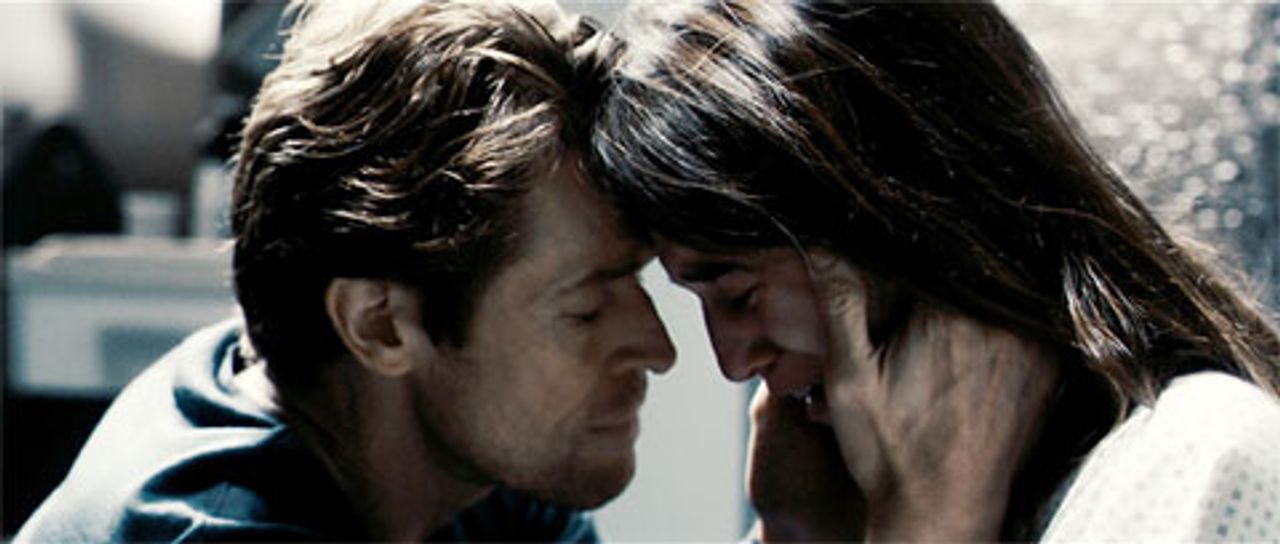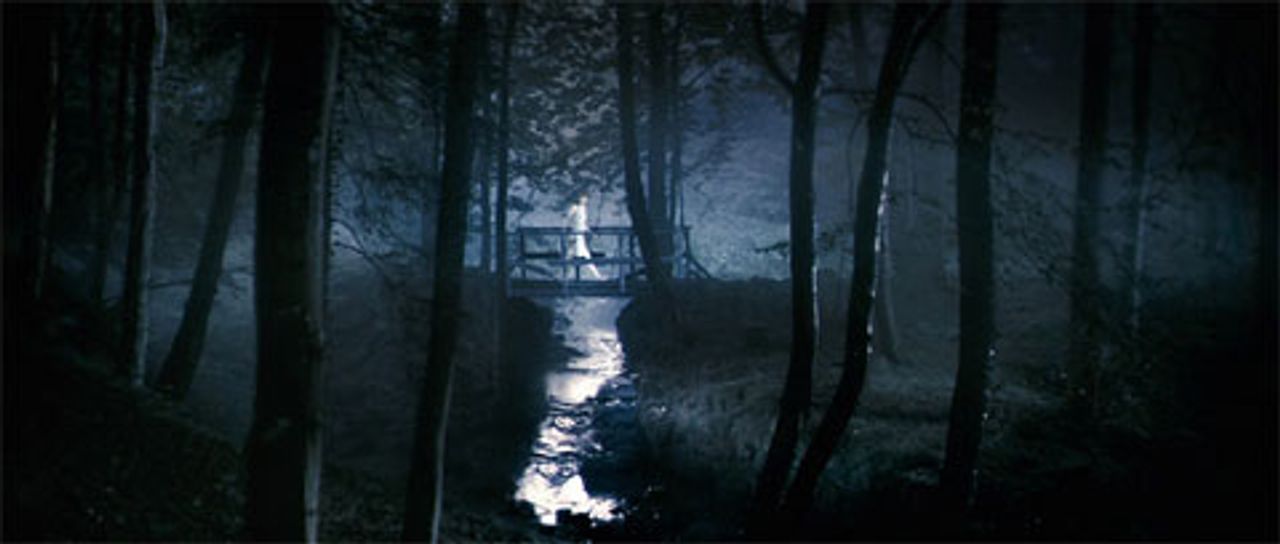This is the sixth and final of a series of articles devoted to the recent Toronto film festival (September 10-19).
Lars von Trier from Denmark, once associated with the Dogme 95 group, has been making films for some two decades (Zentropa, Breaking the Waves, Dancer in the Dark, Dogville). His latest effort is Antichrist. It is a murky, hopelessly contrived, and, frankly, ridiculous film.
 Antichrist
AntichristIn a prologue, ostentatiously done in black-and-white slow motion and accompanied by Handel, while a husband and wife (He and She) make love, their son climbs out onto the ledge of an open window and falls to his death. The parents’ selfishness, their concern with their own pleasure (and especially the mother’s, which is highlighted), is presumably responsible for the tragedy.
The film is divided into chapters, “Grief,” “Pain (Chaos Reigns),” and “Despair (Gynocide).”
Following the child’s death, She (Charlotte Gainsbourg) is consumed with grief. He (Willem Dafoe), a therapist, takes over her treatment from the doctors at a hospital. She confronts him. “You’ve always been distant.” “Give me examples.” “I never interested you until now, when I’m your patient.”
All-knowing, superior, He teaches her “how to breathe.” She wants to have sex. He: “Never screw your therapist.” When the inevitable occurs, He says, with a straight face, “This won’t do. That was the stupidest thing I could do.”
He asks about her fears—which, incidentally, would not appear to have anything directly to do with helping overcome the sorrow or remorse over her son’s death. “Where would you be most afraid?” “The woods.” “What scares you about the woods?” “Everything.” “Any woods in particular?” “Eden [a place where She has stayed the summer before while writing her thesis about the historical mistreatment of women].”
They go the country, to “Eden,” and once there, according to the film’s short synopsis, “nature takes its course and things go from bad to worse….” He wants She to confront her fears. “Let fear come if it likes.” He makes her do all the things that terrify her, thereby, the hope is, working them through. However, as it turns out, her fears are not imaginary: nature and life are frightful, irrational and cruel. Acorns (which menacingly beat on the tin roof) and animals alike are threatening. The very ground burns her feet.
 Antichrist
AntichristAt one point He and She role-play, as “nature” and “rational thought.” “Nature” expresses its desire “to hurt you as much as I can.” “By frightening me?” “By killing you.… I’m outside, but also within.… I’m the nature of all human beings.” In a moment of particular absurdity, He encounters a self-disemboweling fox, who proclaims, “Chaos reigns.”
In the end, She proves to be something of a monster herself, her sexuality frightening and potentially deadly. His smug rationality proves worse than useless.
It is painful to write about von Trier’s film. There were numerous mediocre or worse films at the Toronto festival, but none perhaps that demonstrated “the misanthropy and hysteria” (a phrase we used in 2005 to describe the Dogme group’s efforts) of Antichrist.
In the midst of the final maiming and mayhem, I walked out of the screening. (For those interested in a detailed synopsis, complete with the ending, see http://en.wikipedia.org/wiki/Antichrist_%28film%29.) There seemed no purpose to go on subjecting oneself to something so unpleasant and so untruthful. As we wrote four years ago, “Rarely, even in recent decades, have human beings been treated with such contempt and lack of understanding.”
Dafoe and Gainsbourg try very hard to make something coherent that has no internal logic to it. Von Trier is an eclectic, without the courage of his own convictions, despite a great deal of bravado. Is the Female “evil” incarnate, nature unleashed, frightening, a victimizer, which, from von Trier’s neo-Nietzschean standpoint, ought to be praised and cherished? Or is she the embodiment of “Emotion and Intuition” struggling with “secular-humanist Reason,” a victim of von Trier’s male protagonists, who, according to the filmmaker, “are basically idiots” and oppressors?
 Lars Von Trier
Lars Von TrierThe director, intellectually unserious, wants to have it both ways. “I don’t believe in witches,” he says. “I don’t think women or their sexuality is evil, but it is frightening. It’s important to set yourself free when you’re making a film. Who the hell cares what I think? Certain images and certain concepts are interesting to combine in different ways” (emphasis added). In other words, he takes no responsibility for what he puts on the screen or what might be drawn from the images. Audience members can make of it whatever they like, they are on their own. No significant filmmaker approaches his or her work this way. If von Trier doesn’t care about what he thinks, why should we?
Von Trier (born Lars Trier in 1956 in Copenhagen; the “von” is a joke) is a disoriented and shallow artist, thoroughly ill-equipped to deal with society and life. The child of bohemian leftists, the future director later “rebelled” by converting to Catholicism, although he acknowledges now he is not a believer. Perhaps more to the point, he claims to have had a copy of Nietzsche’s The Antichrist on his bedside table since he was 12. Given the recent state of European “leftism,” the turn to Nietzsche would not necessarily have been so much of an effort.
In The Antichrist (written in 1888, published in 1895), the German philosopher returned to many of his favored themes: contempt for the notion of human equality, and ferocious hostility to democracy, socialism, and revolution. In the work, Nietzsche attacks Christianity, above all, as Georg Lukács notes, for supposedly leading to the French Revolution and, ultimately, modern socialism.
These are typical passages:
“Whom do I hate most heartily among the rabbles of today? The rabble of Socialists, the apostles to the Chandala [the lowest of the Hindu castes], who undermine the workingman’s instincts, his pleasure, his feeling of contentment with his petty existence—who make him envious and teach him revenge…. Wrong never lies in unequal rights; it lies in the assertion of ‘equal’ rights.”
And:
“And let us not underestimate the fatal influence that Christianity has had, even upon politics! Nowadays no one has courage any more for special rights, for the right of dominion, for feelings of honourable pride in himself and his equals—for the pathos of distance…. Our politics is sick with this lack of courage!—The aristocratic attitude of mind has been undermined by the lie of the equality of souls; and if belief in the ‘privileges of the majority’ makes and will continue to make revolution—it is Christianity, let us not doubt, and Christian valuations, which convert every revolution into a carnival of blood and crime! Christianity is a revolt of all creatures that creep on the ground against everything that is lofty: the gospel of the ‘lowly’ lowers.”
Nietzsche writes that pity “thwarts the whole law of evolution, which is the law of natural selection. It preserves what is ripe for destruction; it fights on the side of those disinherited and condemned by life; by maintaining life in so many of the botched of all kinds, it gives life itself a gloomy and dubious aspect.” He proposes that the “weak and ill-constituted shall perish: first principle of our philanthropy. And one shall help them to do so. What is more harmful than any vice?—Active sympathy for the ill-constituted and weak.”
An admirer observes that von Trier is “reactionary, neurotic and anti-modern.” The Film Society of Lincoln Center website carries a piece by Larry Gross, which contains this interesting piece of information: “I worked as a writer for von Trier once. He was involved in preproduction on Breaking the Waves and I was hired by a producer to redo a script von Trier owned about a bizarre historical figure, Baron Ungern von Sternberg, a German-Russian aristocrat and Czarist officer who in 1921 lead anti-Bolshevik forces in Siberia, briefly conquered Mongolia, and dreamed of an Asian Buddhist army that under his command would conquer Europe. Himmler was apparently a huge fan.”
Gross, who considers Antichrist a masterpiece, writes about the prologue (sex juxtaposed to the child falling to his death), “As commentators have observed, it’s an astute allegorical rendering of mankind’s Fall into the mundane corrupt quotidian.”
In the production notes for Antichrist, there is a “Welcome” from the filmmaker, which reads: “I would like to invite you for a tiny glimpse behind the curtain, a glimpse into the dark world of my imagination: into the nature of my fears, into the nature of Antichrist.”
This seems to echo a passage in Nietzsche’s work: “It is painful, a dreadful spectacle which has opened up before me: I have drawn back the curtain on the depravity of man.”
To coin a phrase, if von Trier’s ideas are bad, his drama is worse. He invites us into “the dark world of his imagination,” but why should we want to go there? It’s not interesting, and the events portrayed are largely dull and unconvincing. With the look and feel (and sometimes sound) of one of the contemporary sado-pornographic horror films, everything in Antichrist is muddy and ugly, not the “ugliness” of everyday life, life as it is, but an imposed, pseudo-intellectual, schematic ugliness, the ugliness of misshapen and barren, outdated ideas, which are merely meant to impress. Von Trier is entirely lost, or plays at being so, and celebrates the condition.
The production notes contain an interview with von Trier conducted by Knud Romer, who remarks—again, admiringly—that the writer-director “keeps making the same film over and over again in different, increasingly radical variations.” Romer continues: “That film is about a passive, paranoid man, a megalomaniac, who is bedridden (as in Breaking the Waves) or buried alive (as in Antichrist), while sexually abusing a sick or mentally ill woman to the point of death in order to produce images of sadomasochist desire and voyeuristically satisfy his sexuality.” To whom would this be especially appealing?
In a director’s “confession,” written in March 2009, von Trier explains that two years previously he was suffering from depression. “Six months later, just as an exercise, I wrote a script. It was a kind of therapy, but also a search, a test to see if I would ever make another film. The script was finished and filmed without much enthusiasm, made as it was using about half of my physical and intellectual capacity. The work on the script did not follow my usual modus operandi. Scenes were added for no reason. Images were composed free of logic or dramatic thinking.”
One can feel sympathy for someone suffering such a state of mind. Von Trier tells everyone about his mental condition. The Globe and Mail, reporting on a video press conference at the Toronto film festival, noted that the Danish director “stammered, sighed deeply and repeatedly, his hands shook. He appeared to be having trouble catching his breath and putting sentences together. Quickly, he admitted to the crowd that he is suffering from anxiety and depression, that the film is a manifestation of his anxieties and fears, and that ‘I’ve been drinking a lot every day and not doing any yoga at all.’ “
Let’s assume this is not posturing. Clearly, von Trier should be seeking psychiatric help in such difficult circumstances, rather than working on a film “without much enthusiasm,” half-heartedly adding scenes “for no reason,” constructing images “free of logic or dramatic thinking.” The experience of making Antichrist may or may not have been personally therapeutic, but the results are terribly poor.
Von Trier compares himself to the Swedish playwright August Strindberg and his notorious “Inferno Crisis” in the mid-1890s, during which the writer descended into madness. “I read Strindberg when I was young. I read with enthusiasm the things he wrote before he went to Paris to become an alchemist and during his stay there...the period later called his ‘inferno crisis’—was ‘Antichrist’ my Inferno Crisis? My affinity with Strindberg?”
Of course, an important difference is that Strindberg, despite his bouts of irrationality and some very retrograde ideas, possessed genuine artistic talent. He was able, when lucid, to write dialogue and scenes (in plays such as The Father, Miss Julie, Creditors, The Stronger, and others) very much ‘burdened’ with logic and dramatic thinking.
Von Trier, so far, has not given any indication of such artistry. Aside from unquestionable audacity and marketing skill (above all, for self-promotion), the Dane has not displayed very much. There is not a single dramatic sequence that one can recall from his films with pleasure. What one remembers is the tone of general disgust for humanity, which von Trier effectively incorporates into nearly every scene and image. If he has attracted critical acclaim, and an audience, it is a symptom of a wider malaise.
* * * * *
To end on that note is unfortunate. At the Toronto festival this year there were a number of serious works: Ajami, How To Fold a Flag, Men on the Bridge, The Unloved, Jean Charles, Northless, Life During Wartime, The Time That Remains, Shirley Adams, La Pivellina, and others. One shouldn’t make claims for these films they can’t live up to, but they prove there are sincere, rational, and empathetic human beings at work in cinema.
Concluded
